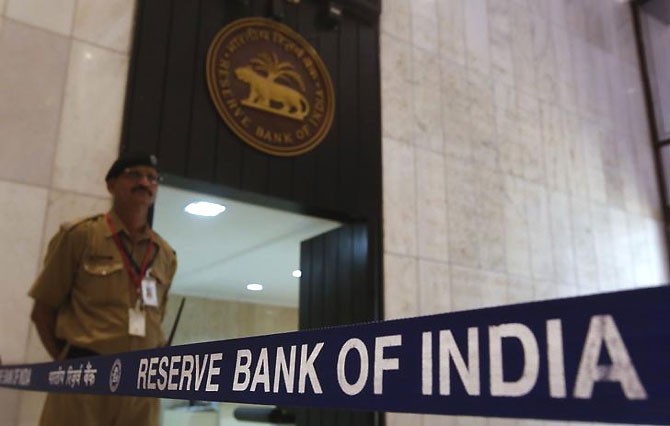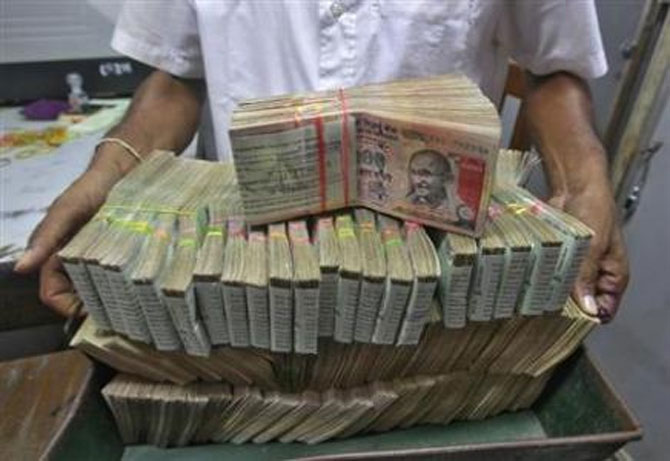 | « Back to article | Print this article |
RBI expected to raise interest rates, roll back rupee support
The RBI is expected to raise policy interest rates for the second time in as many months on Tuesday to fight stubbornly high inflation, while rolling back further emergency measures put in place recently to support the slumping rupee.
Despite the risks to an already sluggish economy, the Reserve Bank of India (RBI) is forecast to lift its policy repo rate by 25 basis points (bps) to 7.75 per cent, according to 29 of 41 economists polled by Reuters.
New RBI chief Raghuram Rajan, a high-profile former chief economist at the International Monetary Fund, took office in early September and stunned markets in his first policy review just weeks later by raising interest rates to combat fierce price pressures dogging Asia's third-largest economy.
"Given that food price inflation is at a 38-month high, there is a risk that it could spread to generalised inflation expectations," said Samiran Chakraborty, head of research at Standard Chartered in Mumbai.
Annual food inflation accelerated to 18.4 percent in September, its highest since mid-2010, pushed up by prices of vegetables including onions and stirring public discontent ahead of national elections which must be held by next May.
"At this moment, it is likely that overall there would be a bias towards fighting inflation," he said, adding that the RBI may raise the policy repo rate by 25 bps on Tuesday and by the same amount in December.
In its quarterly macroeconomic review on Monday, the central bank said it expects inflation to remain near current elevated levels for the remainder of the fiscal year that ends in March.
"Both WPI (wholesale price index) and CPI (consumer price index) inflation may stay range-bound around the current levels that remain above comfort levels," it said in its report.
Click on NEXT for more...
RBI expected to raise interest rates, roll back rupee support
Further unwinding of rupee measures seen
While the central bank looks set to raise its repo rate, it is likely to cushion the blow to credit markets by further unwinding liquidity tightening measures implemented this summer as it struggled to shore up the tumbling rupee.
The rupee slumped to record lows in August, at one point sliding some 20 percent for the year, on concerns about the country's gaping current account and fiscal deficits, and as global investors dumped emerging market assets for fear the U.S. Federal Reserve was set to start tapering its massive stimulus programme.
The currency has since clawed back some ground, giving the RBI room to lower its Marginal Standing Facility (MSF) rate a further 25 bps to 8.75 percent, the Reuters poll showed. Lowering the MSF, an overnight borrowing rate for banks, eases the cost of funds for lenders, fuelling credit growth.
The RBI had jacked up the MSF by 200 bps in July as the rupee sagged. It rolled back 75 bps of that at its September 20 review and another 50 bps earlier this month. The combination of a repo increase and further MSF cuts would restore the gap between the two rates to its usual 100 bps.
The rupee closed on Monday at 61.52 to the dollar, down 10.6 per cent on the year, after stabilising in recent months on the back of India's support measures as well as the delay in the Fed's expected winding-down of its stimulus.
"The strategy will be to continue on the path of dismantling the extraordinary measures taken during the rupee crisis. I don't think he (Rajan) will be ultra-hawkish and will emphasise that growth is a concern and that also needs to be tackled," said Abheek Barua, chief economist at HDFC Bank.
India's economy grew at 4.4 per cent in the June quarter, the slowest since early 2009. The 5 percent growth rate recorded in the last fiscal year through March was the weakest in a decade.
On Monday, the RBI said it expects a "modest" growth improvement in the second half of the fiscal year.
Still, the headline wholesale price index (WPI) unexpectedly hit a seven-month high in September of 6.46 percent as food prices surged, while the consumer price index jumped an annual 9.84 percent, spurring expectations for another rate hike.

